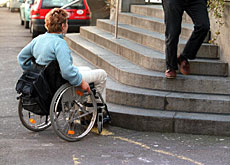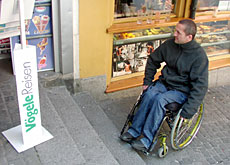Counting the cost of disabled rights

On May 18 the Swiss will decide whether to force the government to ensure access to public buildings for the country's 700,000 disabled.
The government, which opposes the people’s initiative on disabled rights, maintains a “yes” vote would break both federal and cantonal budgets.
Luzius Mader of the justice ministry says although exact figures are hard to calculate, the financial impact of the initiative would be devastating if it were accepted.
“In the field of transport alone, costs would amount to around SFr4 billion ($3 billion) under the terms of the initiative,” he told swissinfo.
“Under a new law [which would be phased in next year] those costs would be around SFr600 million,” he added.
“The difference occurs because the initiative requires guaranteeing access to public transport immediately, whereas the law allows for a transition period,” he added.
Gradual change
Mader says the transition period gives transport companies, for example, up to 20 years to phase in changes to their buildings, rolling stock and vehicles.
The new law, he says, would also guarantee the disabled access to all new buildings open to the public.
But wheelchair-bound parliamentarian, Marc Suter, maintains the new law does not go far enough.
Although Suter welcomes its provisions as a “step in the right direction” he says a major failing is that it does not apply to existing buildings unless they are being renovated.
He supports the initiative’s demands for immediate access for the disabled to all public buildings and services and is not prepared to wait 20 years.
“We don’t have to wait a whole generation for change,” he told swissinfo. “We have a right for change to happen now.”
Basic human right
Suter rejects claims that the costs incurred by the initiative would be prohibitive, and insists the disabled in Switzerland be afforded the same rights to mobility and access as the rest of the population.
“Experience suggests that the costs for adapting buildings to meet the needs of the disabled are relatively small,” he said.
“In the building sector alone it is a maximum of five per cent, and I think that’s affordable in a rich country (such as Switzerland),” he added.
“We don’t want to trade off human rights against costs.”
Mader admits that from a moral point of view it is difficult to tell a disabled person that access to a public building could well remain limited for years to come
But he argues that the government has to be pragmatic and avoid making promises it cannot keep.
A vote against the disabled?
Mader’s boss, the justice minister, Ruth Metzler, also rejects accusations by the initiative’s supporters that a “no” vote would amount to a “vote against the disabled”.
“I regret that this was said and I cannot agree,” she told swissinfo.
“The government and parliament want this new law – we want to do something about discrimination against disabled people.
“The initiative goes too far and it’s wrong to say that those who are against it are against disabled people.”
swissinfo, Jonathan Summerton
Less than 30 per cent of buildings open to the public currently offer the disabled unhindered access.
The initiative wants immediate access for the disabled to buildings and services open to the public.
It also calls for the rights of Switzerland’s 700,000 disabled to be enshrined within the constitution.
A new law, which would phase-in disabled access rights, comes into force next year.

In compliance with the JTI standards
More: SWI swissinfo.ch certified by the Journalism Trust Initiative



You can find an overview of ongoing debates with our journalists here. Please join us!
If you want to start a conversation about a topic raised in this article or want to report factual errors, email us at english@swissinfo.ch.